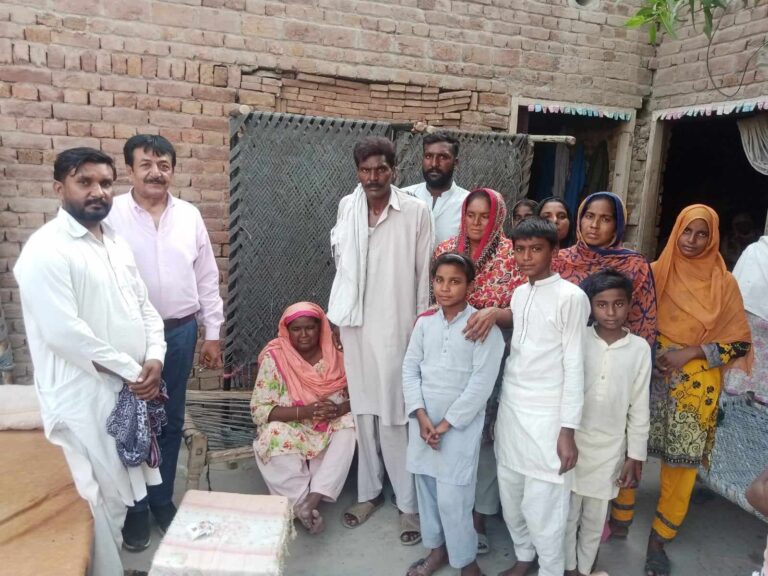In a chilling and heart-wrenching incident that underscores the vulnerability of minority communities in Pakistan, Ahsan Masih, a disabled Christian farm worker in Faisalabad, was forcibly detained and subjected to extreme brutality by Muslim landlords, ultimately leading to his tragic death.
Ahsan’s abduction, torment, and subsequent murder have exposed the harrowing challenges faced by religious minorities in the country and have once again ignited calls for justice and protection.
On Sat 9th Sept join our London protest.
Ahsan Masih, a 32-year-old Christian, residing in the village of 7 Chak Panj Garayeen in Faisalabad, found himself in the clutches of tragedy on August 30th, 2023. In broad daylight, he was forcibly taken away at gunpoint by powerful landowners in the region. What unfolded next was nothing short of a nightmare – Ahsan was subjected to inhumane treatment, including electric shocks, mutilation of toes, whipping and severe beatings. It is believed that Ahsan succumbed to the savage violence on September 1st, 2023, leaving his family grief-stricken.
Ahsan Masih had a deep bond with Shahbaz Masih, his co-worker at a local brick kiln, whom he considered as his own brother, as Shahbaz had no family or home. In June, Ahsan took on the role of a guarantor for a loan of Rs. 400,000 (£1034) that Shahbaz borrowed from Muslim landlords, specifically Muhammad Aslam, a resident of Salarwala Chak in Faisalabad. The agreement was informal, with Shahbaz agreeing to work at Muhammad Aslam’s farm until the borrowed money was repaid. Ahsan accompanied Shahbaz to Salarwala Chak to assist him in his farm work.
In August, when Shahbaz Masih experienced health issues, Ahsan Masih received permission to accompany him to a Cardiology Center for a medical checkup. Mr. Shahbaz was subsequently admitted and remained under medical care for two weeks. During this period, Ahsan Masih faithfully stayed by his friend’s side, providing him with much-needed care and support. However, the day Shahbaz was discharged from the hospital, Ahsan had briefly returned to his village to visit his family. Upon his return, he was shocked to discover that Shahbaz had been discharged from the hospital without notifying him.
Despite the unexpected turn of events, Ahsan, as a loyal friend, decided to return to the farm alone to resume work, despite a physical disability, which affected his right leg. However, Muhammad Aslam and his family harbored suspicions that Mr. Masih might have had a role in Shahbaz’s departure and knew of his whereabouts. Fueled by their conviction, they began to treat Ahsan with hostility and aggression.
Ahsan did not inform his employers when, on August 20th, he decided to return to his village and work alongside his brothers on a local landlord’s farm.
On August 30th, a group of unidentified individuals arrived at the field where Ahsan was tending to cattle and forcibly abducted him at gunpoint. Ahsan’s younger brother, Nadeem Masih, who witnessed the abduction, immediately called the police at 15 to report the incident. However, due to the missing number plate on the abductors’ vehicle, the police were initially unable to take immediate action.
Nadeem Masih explained what happened: “Some unknown men in a white Nissan Corolla car arrived in the fields where Ahsan Masih was cutting grass for the cattle. They brandished their guns, threatening me to stay silent. Then, they forcibly seized Ahsan, pulling him into the car, and swiftly drove away.”
Later that evening, Muhammad Aslam contacted Nadeem Masih and informed him that Ahsan was in their custody and would be released only if the family paid Shahbaz Masih’s debt. Nadeem, relieved by this communication, hoped for his brother’s eventual safe return. Unfortunately, his hopes were shattered when, on September 1st, a police officer from Salarwala police station delivered the devastating news: Ahsan Masih’s lifeless body had been recovered from a desolate room commonly used to store cattle feed at Muhammad Aslam’s farm.

The news of Ahsan’s murder plunged the already impoverished family into profound sorrow. Nadeem Masih, alongside Pastor David of the Pentecostal Church in the village, went to the Allied Hospital to receive Ahsan’s body. What they encountered was a body marred by signs of brutalization – bruises, head injuries, mutilated fingers and toes, and discolored skin, all bearing witness to the torment Ahsan endured.
Nadeem Masih said, “It was heart-wrenching to discover my younger brother’s lifeless body in the hospital. The doctors had already conducted the post-mortem examination.” “His entire body bore signs of bruises, with his head sustaining injuries, his fingers mutilated, and his skin turned blue due to the beatings.”
Nadeem Masih, determined to seek justice for his brother, filed an FIR (First Information Report) against the culprits – Muhammad Aslam and his associates, Muhammad Sarwar, Mansib Ali, and Mithoo. These individuals, despite their wealth and political connections, are now in police custody, facing charges of murder and kidnapping related to Ahsan Masih.
However, Nadeem Masih’s pursuit of justice has not come without peril. He has been subjected to threats from the culprits, who have warned him to withdraw his application or face consequences similar to his brother’s fate. Nadeem, undeterred, asserts his determination to hold his brother’s murderers accountable for their heinous crime.
The Masih family is financially disadvantaged and incapable of shouldering the legal costs associated with seeking justice. However, the British Asian Christian Association (BACA) has stepped in to provide full legal support to the grieving family in their quest for justice. The cost of hiring a solicitor to represent Ahsan Masih’s family will be substantial, and murder trials in Pakistan are notoriously lengthy. Please assist us in providing this service by donating (here). BACA has covered all costs for the funeral of Ahsan Masih to help the grieving family.
Juliet Chowdhry, trustee for British Asian Christian Association, said:
“Ahsan’s tragic fate serves as a stark reminder that while laws may exist on paper, their effectiveness depends on their robust enforcement and the broader social and economic context.
“The disturbing account of Ahsan Masih’s abduction and murder casts a dark shadow on Pakistan’s international reputation. Such incidents not only shock the conscience but also serve as a reminder of the urgent need for authorities to take decisive action in order to ensure justice and restore the nation’s dignity.
“Pakistan, like any country, is judged by how it upholds the principles of justice, human rights, and equality for all its citizens, regardless of their religious or ethnic background.
“Failure to provide justice for Ahsan will tarnish further the nation’s image, perpetuating a climate of fear and insecurity among minority communities.
Ahsan’s brutal murder raises several troubling questions, and one of the most pressing is how, despite the implementation of the Bonded Labour System (Abolition) Act of 1992 in Pakistan, Christians and members of other minority communities continue to be trapped in indentured labor contracts. The Bonded Labour System Abolition Act was enacted to eradicate the deeply entrenched practice of bonded labor and ensure the protection and freedom of labourers across the country. However, the persistence of such practices, as seen in Ahsan’s case, underscores significant challenges in its enforcement and highlights the need for urgent reforms and increased vigilance.
Several factors contribute to the ongoing prevalence of bonded labor, particularly among minority communities:
- Weak Enforcement: One of the primary reasons behind the persistence of bonded labor is weak enforcement of existing laws. While Pakistan has taken legislative steps to abolish the system, the implementation of these laws remains inconsistent, allowing unscrupulous employers and landlords to exploit vulnerable workers.
- Lack of Awareness: Many individuals subjected to bonded labor, especially in remote and marginalized communities, may not be aware of their legal rights or how to access legal recourse. This lack of awareness often leaves them in a state of dependency and exploitation.
- Economic Vulnerability: Poverty and economic vulnerability make individuals more susceptible to becoming bonded laborers. Often, workers are coerced into accepting loans or advances under exploitative terms, which effectively bind them to a cycle of debt and servitude.
- Cultural and Social Norms: Deeply ingrained cultural and social norms can also perpetuate bonded labor. Discrimination against religious minorities may contribute to their vulnerability and exploitation, as seen in Ahsan’s case.
To address these issues and prevent further instances of bonded labor, Pakistan must take comprehensive action:
- Strengthen Enforcement: The government should enhance the enforcement of labor laws, ensuring that employers who engage in bonded labor practices face strict penalties.
- Raise Awareness: Initiatives to raise awareness about labor rights and available legal protections must be implemented, particularly in marginalized communities.
- Economic Empowerment: Programs aimed at economic empowerment, skill development, and job creation can help vulnerable individuals break free from cycles of bonded labor.
- Cultural Sensitivity: Promote tolerance and inclusivity, fostering an environment where religious minorities are protected from discrimination and exploitation.


